#when i was 12 i saw a seal with cancer being operated on and i decided i never wanted to see the inside of a body ever again
Text
"stop talking about harrow fingering the chussy" listen i don't love it either but you gotta understand there is PRECEDENT

like of COURSE harrow is going to finger the chussy. it comes free with your lesbian jesus resurrection narrative
#i just don't like thinking about people's insides. personally#when i was 12 i saw a seal with cancer being operated on and i decided i never wanted to see the inside of a body ever again#the locked tomb#image id in alt text#chussyposting#nonasbirthday
4K notes
·
View notes
Link
Clint Lorance had been in charge of his platoon for only three days when he ordered his men to kill three Afghans stopped on a dirt road.
A second-degree murder conviction and pardon followed.
Today, Lorance is hailed as a hero by President Trump.
His troops have suffered a very different fate.
Depression
Fatal car crash
Shooting death
Cancer
Hospitalizations
Drug abuse
PTSD
Arrests
Alcoholism
Suicide
‘The Cursed Platoon’

By Greg Jaffe
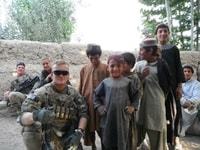
James O. Twist poses with local children during his deployment in Afghanistan in 2012. (Courtesy of the Twist family)
They thought of the calls and texts from him that they didn’t answer because they were too busy with their own lives — and Twist, who had a caring wife, a good job and a nice house — seemed like he was doing far better than most. They didn’t know that behind closed doors he was at times verbally abusive, ashamed of his inner torment and, like so many of them, unable to articulate his pain.By November 2019, Twist, a man the soldiers of 1st Platoon loved, was gone and Lorance was free from prison and headed for New York City, a new life and a star turn on Fox News.This story is based on a transcript of Lorance’s 2013 court-martial at Fort Bragg, N.C., and on-the-record interviews with 15 members of 1st Platoon, as well as family members of the soldiers, including Twist’s father and wife. The soldiers also shared texts and emails they exchanged over the past several years. Twist’s family provided his journal entries from his time in the Army. Lorance declined to be interviewed.In New York, Sean Hannity, Lorance’s biggest champion and the man most responsible for persuading Trump to pardon him, asked Lorance about the shooting and soldiers under his command.Lorance had traded in his Army uniform for a blazer and red tie. He leaned in to the microphone. “I don’t know any of these guys. None of them know me,” Lorance said of his former troops. “To be honest with you, I can’t even remember most of their names.”
The soldiers of 1st Platoon tell their story
An ‘entire month of despair’
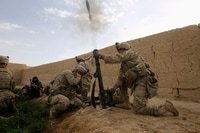
Soldiers from the 1st Platoon fire a mortar during a firefight with Taliban in April 2012 in Kandahar province, southern Afghanistan. (Baz Ratner/Reuters)
The 1st Platoon soldiers came to the Army and the war from all over the country: Maryland, California, Pennsylvania, Oregon, Indiana and Texas to name just a few. They joined for all the usual reasons: “To keep my parents off my a–,” said one soldier.
“I just needed a change,” said another.
A few had tried college but quit because they were bored or failing their classes. “I didn’t know how to handle it,” Gray said of college. “I was really immature.”
Others joined right out of high school propelled by romantic notions, inherited from veteran fathers, grandfathers and great-grandfathers, of service and duty. Twist’s father served in Vietnam as a clerk in an air-conditioned office before coming back to Michigan and opening a garage. In his spare time Twist Sr. was a military history buff, a passion that rubbed off on his son, who visited World War II battle sites in Europe with his dad. Twist was just 16 when he started badgering his parents to sign his enlistment papers and barely 18 when he left for basic training. His mother had died of cancer only a few months earlier.
“I got pictures of him the day we dropped him off, and he didn’t even wave goodbye,” his father recalled. “He was in pig heaven.”

Members of the 1st Platoon James O. Twist, Reyler Leon, Joe Morrissey, Andy Lehrer, Mike McGuinness, Dallas Haggard (kneeling) and Brandon Krebs pose with a flag in Afghanistan in 2012. (Courtesy of the Twist family)
Several of the 1st Platoon soldiers enlisted in search of a steady paycheck and the promise of health insurance and a middle-class life. “I needed to get out of northeast Ohio,” McGuinness said. “There wasn’t anything there.”
In 1999, he was set to pay his first union dues and go to work alongside his steelworker grandfather when the plant closed. So he became a paratrooper instead, eventually deploying three times to Afghanistan.
McGuinness didn’t look much like a paratrooper with his thick, squat body. But he liked being a soldier, jumping out of planes, firing weapons and drinking with his Army buddies. After a while the war didn’t make much sense, but he took pride in knowing that his soldiers trusted him and that he was good at his job.
Nine months before 1st Platoon landed in rural southern Afghanistan, a team of Navy SEALs killed Osama bin Laden.

Jarred Ruhl, Dallas Haggard and Mike McGuinness in Afghanistan in June 2012. (Courtesy of the Carson family)
Samuel Walley, the badly wounded soldier Twist pulled from the blast crater, wondered if they might be spared combat. “Wasn’t that the goal to kill bin Laden?” he recalled thinking. “Isn’t that checkmate?”
Around the same time, Twist was trying to make sense of what was to come. “I feel like the Army was a good decision, but also in my mind is a lot of dark thoughts,” he wrote in a spiral notebook. “I could die. I could come back with PTSD. I could be massively injured.”
“Maybe,” he hoped, “it will start winding down soon.”
But the decade-long war continued, driven by new, largely unattainable goals. When McGuinness saw where the platoon was headed — just 15 or so miles from the spot in southern Afghanistan where he had spent his second tour — he warned the new soldiers they were going to be “fighting against dudes who just really f—ing hate you.”
[ Are you a veteran? We want to hear your response to this story.4 ]
They were told by commanders they were waging a counterinsurgency war in which their top priority was winning the support of the people and protecting them from the Taliban. But no one seemed entirely sure how to accomplish that goal. They helped build a school that never opened because of a lack of teachers and willing students. They met with village elders who insisted they knew nothing about the Taliban’s operations or plans.
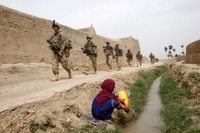
An Afghan girl watches as soldiers from the 1st Platoon walk by during a mission in April 2012, in the Zhary district of Kandahar province, southern Afghanistan. (Baz Ratner/Reuters)
In May 2012, they moved to a new compound near Payenzai, a remote Afghan village west of Kandahar, which consisted of little more than mud-walled houses, hardscrabble farmers and the Taliban.
So began what Twist described, in a blog post written years later, as an “entire month of despair.”
Four soldiers were severely wounded in quick succession. On June 6, Walley lost his leg and arm to a Taliban bomb. Eight days later, yet another enemy mine wounded Mark Kerner and 1st Lt. Dominic Latino, the platoon leader. Then, on June 23, a sniper’s bullet tore through Matthew Hanes’s neck, leaving him paralyzed.
The platoon was briefly sent back to a larger base a few miles away to shower, meet with mental-health counselors and pick up their new platoon leader. Lorance had served a tour as an enlisted prison guard in Iraq before attending college and becoming an infantry officer. He had spent the first five months of his Afghanistan tour as a staff officer on a fortified base.
This was his first time in combat.

1st Lt. Clint Lorance during training at Fort Bragg before the deployment to Afghanistan in 2012. (Photo by Alan Gladney)
“We’re not going to lose any more men to injuries in this platoon,” he told then-Sgt. 1st Class Keith Ayres, his platoon sergeant, shortly after taking over on June 29, according to Ayres’s testimony.
His strategy, he said, was a “shock and awe” campaign designed to cow the enemy and intimidate villagers into coughing up valuable intelligence. When an Afghan farmer and his young son approached the outpost’s front gate and asked permission to move a section of razor wire a few feet so that the farmer could get into his field, Lorance threatened to have Twist and the other soldiers on guard duty kill him and his boy.
“He pointed at the child . . . at the little, tiny kid,” Twist testified. He estimated the child was 3 or 4 years old.
On Lorance’s second day, he ordered two of his sharpshooters to fire within 10 to 12 inches of unarmed villagers. His goal was to make the Afghans wonder why the Americans were shooting at them and motivate them to attend a village meeting that Lorance had scheduled for later in the week, his soldiers testified.
His real motive, though, seems to have been cruelty. “It’s funny watching those f—ers dance,” Lorance said, according to the testimony of one of his soldiers. Lorance didn’t pull the trigger. Instead, he stood by his men in the guard towers, picked the targets and issued orders. His troops finally balked when he told them to shoot near children. They refused again a few hours later when he ordered them to file a false report saying that they had taken fire from the village.
“If I don’t have the support of my NCOs then I’ll f—ing do it myself,” Lorance exclaimed, according to testimony, referring to noncommissioned officers.
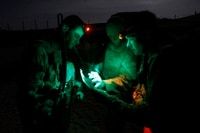
Sgt. 1st Class Keith Ayres looks over maps with other soldiers from the 82nd Airborne Division in April 2012, before a joint mission with the Afghan army in Kandahar province. (Baz Ratner/Reuters)
On the day of the killings for which he would be convicted, Lorance posted a sign in the platoon headquarters stating that no motorcycles would be permitted in his unit’s sector. The platoon’s soldiers were falsely told before the day’s patrol that motorcycles should be considered “hostile and engaged on sight.” Several soldiers testified that Lorance told them that senior U.S. officials had ordered the change. At least two sergeants recalled the guidance had come from the Afghans and did not apply to U.S. forces. Due to the conflicting testimony, the jury of Army officers acquitted Lorance of changing the rules of engagement. Still, Lorance’s actions left soldiers confused on the critical, life-or-death question of when they were authorized to open fire.
The mission that day was a foot patrol into a nearby village to meet the elders.
Less than 30 minutes after they rolled out of the gate, three men on a motorcycle approached a cluster of Afghan National Army troops at the front of their formation. Lorance and his troops were standing about 150 to 200 yards away in an orchard, tucked behind a series of five-foot-high mud walls on which the Afghans grew grapes.
At the trial, Lorance’s soldiers recalled how he had ordered them to fire.
“Why aren’t you shooting?” he demanded.
A U.S. soldier fired and missed. The motorcycle carrying the three men, none of whom appeared to be armed, came to a stop. Upon hearing the shots, McGuinness began running toward Lorance, who was closer to the front of the U.S. patrol, to see why they were shooting.
The puzzled Afghans were now standing next to the stopped motorcycle, “trying to figure out what had happened,” according to one soldier’s testimony. Gray, who was watching from a nearby armored vehicle, recognized the eldest of the three men as someone the Americans regularly met with in the village. He recalled the Afghans waving at them.

Todd Fitzgerald testifies during Clint Lorance’s 2013 court-martial at Fort Bragg, N.C.
“Smoke ’em,” Lorance ordered over the radio.
At first Gray and the other soldiers in the armored vehicle weren’t sure whom Lorance wanted them to shoot. “There was a back and forth with the three of us in the vehicle,” Gray recalled in an interview.
Then Pvt. David Shilo, who was in the turret of the armored vehicle just inches from Gray, fired, striking one of the men, who fell into a drainage ditch. Because the platoon had been told that morning that motorcycles weren’t allowed in their sector, Shilo testified that he thought he was acting on a lawful order. Shilo declined to be interviewed.
The two surviving Afghan men bent to retrieve their dead colleague when Shilo cleared his weapon and shot again, killing a second Afghan. The third man ran away. Two U.S. soldiers testified that it was possible that an Afghan soldier also fired.
A few minutes later, a boy approached the dead men and the motorcycle, which was standing on the side of the road with its kickstand still down. Lorance ordered Shilo to fire a third time and disable the bike. This time he refused.
“I wasn’t going to shoot a 12-year-old boy,” Shilo testified.

David Shilo testifies during Clint Lorance’s 2013 trial at Fort Bragg, N.C.
Relatives of the dead were now on the scene screaming and crying. Lorance’s immediate superior officer, Capt. Patrick Swanson, who was two miles away and couldn’t see what was happening, ordered him over the radio to search the bodies.
Lorance was convicted of lying to Swanson, telling him that villagers had carried off the corpses before his men could examine them. In fact, Lorance’s troops searched the bodies of the dead Afghans and found ID cards, scissors, some pens and three cucumbers, but no weapons, according to testimony.
The troops continued their patrol into the village while McGuinness and a small team of soldiers provided cover from a nearby roof. About 30 minutes after the first shooting, McGuinness spotted two Afghan men talking on radios.
“We have to do something to the Americans,” one of the men was saying, according to U.S. intercepts. McGuinness and his troops received permission from the company headquarters to fire and killed the two men. The platoon cut short the patrol and returned to the base.
At the outpost the soldiers were shaken. “This doesn’t feel right,” Gray said.
“It’s not f—ing right at all,” McGuinness replied.

Lucas Gray, Joe Fjeldheim and Mike McGuinness in Afghanistan 2012. (Courtesy of the Carson family)
A few minutes later Lorance burst into the platoon’s headquarters ebullient. “That was f—ing awesome,” he exclaimed, according to court testimony.
“Ayres looked sick,” one of the platoon’s soldiers testified. McGuinness was furious.
The lieutenant tried to reassure his sergeants. “I know how to report it up [so] nobody gets in trouble,” he said, according to testimony.
Lorance’s soldiers turned him in that evening, and at the July 2013 trial, 14 of his men testified under oath against him. Four of those soldiers received immunity in exchange for their testimony. Lorance did not appear on the stand, and not one of his former 1st Platoon soldiers spoke in his defense. The trial lasted three days. It took the jury of Army officers three hours to find him guilty of second-degree murder, making false statements and ordering his men to fire at Afghan civilians. The jury handed down a 20-year sentence.
In response to a Lorance clemency request, an Army general reviewed the conviction and reduced the sentence by one year.
‘Why do you care so much?’
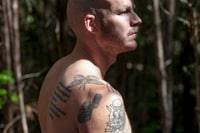
Dave Zettel reveals a tattoo of a lighter to represent the 82nd deployment outside his home in Blythewood, S.C. (Bonnie Jo Mount/The Washington Post)
The war crimes and their aftermath followed Lorance’s soldiers home to Fort Bragg and, in some cases, into their nightmares. On many nights Gray woke up to the image of a group of Afghan soldiers surrounding his cot and emptying their rifles into his sleeping body in retaliation for the murders.
“I dreamed it,” he said, “because I thought that’s what would happen.”
Dave Zettel wasn’t on the patrol when the killings were committed but was in the guard tower when Lorance ordered him and another soldier to fire harassing shots into the neighboring village. On his first full day back in the States, Zettel went out to a dinner with a large group from the platoon and their families.
By the end of the night, the soldiers, rattled from the tour, the stress of Lorance’s upcoming trial and the return home, were intoxicated and emotionally falling apart. Zettel held it together until he was alone in a taxi with his wife and brother. In the quiet of the cab, he felt a crushing guilt that he had made it home unscathed.
“I just lost my s—. I felt like a failure,” he said. “I felt abandoned and so f—ing angry.”
In Afghanistan, Army investigators, who were primarily pursuing Lorance, threatened Zettel with aggravated assault charges for the shootings in the tower. And they showed McGuinness a charge sheet accusing him of murder for killing the Afghans who were talking on the radios about targeting Americans.
The threats of prosecution hung over them for months. Eventually, the Army concluded that McGuinness’s actions were justified. Prosecutors never pursued charges against Zettel.
Instead the Army issued administrative letters of reprimand to Zettel and Matthew Rush, the soldier who fired the rounds at the civilians from the tower. Zettel had watched from the tower but did not shoot.
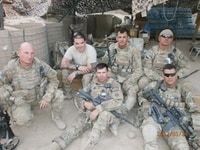
The 1st Platoon leadership team in Afghanistan in May 2012. From left: Dan Williams, Mike McGuinness, Chris Murray (sitting), Keith Ayres, Dominic Latino and Jace Myers (sitting, right). (Courtesy of the Carson family)
Ayres and McGuinness — the senior sergeants in the platoon — received disciplinary letters, which can hinder or delay promotions, for their failure to turn Lorance in sooner or stop the killings on the third day.
McGuinness legally changed his surname, which had been Herrmann, in an effort to shed the stigma of the crimes. “I wanted to get away from the entire situation and I thought I’ll change units and no one will know,” he said. But, because of the investigation and trial, McGuinness’s orders to report to an airborne unit in Italy were canceled. “I ended up staying. People didn’t forget,” he said. “It was awful.”
Shilo, who fired the fatal shots at the men on the motorcycle, was granted immunity and left the Army not long after the trial.
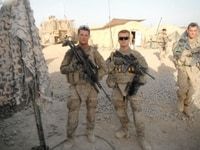
Lucas Gray and James O. Twist in Afghanistan in 2012. (Courtesy of the Twist family)
Even those who weren’t punished or even on the patrol that day felt tainted. To some of their fellow troops they were the “murder platoon,” a bunch of out-of-control soldiers who had wantonly killed Afghans. To others they were turncoats who had flipped on their commander. Gray was waiting for a parachute jump at Fort Bragg when he overheard a lieutenant colonel deride the platoon as nothing but a bunch of “traitors and cowards.” Gray was just a low-ranking specialist, so he kept his mouth shut.
The unit had seen some of the heaviest fighting of the long Afghanistan war, but received no awards for valor. There was no recognition for Twist, who had pulled Walley from a blast crater and applied a tourniquet to the remains of his arm and leg. No one acknowledged Joe Fjeldheim, the platoon medic, who had cut a hole in Hanes’s neck and inserted a breathing tube after a sniper’s bullet left him paralyzed and choking for air.
“Not a single write up. The only thing we received were Purple Hearts for the guys that got messed up,” Zettel said. “We were treated like we had an infectious disease. The Lorance issue evaporated any support from the Army when we got back, and it was absolutely crushing to those who needed help.”
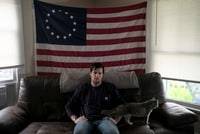
“I think when you see stuff like that sometimes it just flips a switch in some people and you’re just not the same. … I almost drank myself to death for two years,” said Lucas Gray at home in Pulaski, Va. (Bonnie Jo Mount/The Washington Post)
A group from the unit gathered regularly at Zettel’s apartment off post to drink. Some Saturdays Fjeldheim would show up at 9:30 a.m. with booze and a plan to stay numb through the weekend. When the troops were too hung over to make it to mandatory morning formation and training, he would administer intravenous drips in the barracks.
“I was working at Macy’s, and I’d dread coming home because someone was doing something stupid or crying in the bathroom,” said Zettel’s wife, Kim. Often, it fell to her to offer a bit of empathy.
The soldiers blamed the killings when they were passed over for promotions or stripped of rank for drinking too much or missing formations. In early 2014, Gray was hospitalized for alcohol withdrawal and put on suicide watch. He had been drinking a half-gallon of whiskey each night to fall asleep. “It was my off switch,” he said. A few days into his hospital stay, when he was still dosed up on Valium, an officer visited him.
“Why are you like this?” the officer pressed. “They are just dead Afghans. Why do you care so much?”
The question infuriated Gray. Before the war crimes, he had believed he was helping Afghans and defending his country. “It’s like you’re this hardcore Christian and some entity drops from the ceiling and says it’s a sham,” he said. “That’s how it was for me. I thought of the Army as this altruistic thing. I thought it was perfect and honorable. It pains me to tell you how stupid and naive I was. The Lorance stuff just broke my faith. . . . And once you lose your values and your faith, the Army is just another job you hate.”
‘You need to stop running your mouth’

Mike McGuinness at home in Raeford, N.C. McGuinness legally changed his surname, which had been Herrmann, in an effort to shed the stigma of the crimes. (Bonnie Jo Mount/The Washington Post)
McGuinness tried to intervene on behalf of his soldiers. He talked to Gray’s new commanders, who McGuinness said wanted to run him out of the Army for being drunk.
“Did you ask him why he’s drinking too much?” McGuinness pressed them.
Zettel asked McGuinness to meet with his new platoon sergeant when the Army, without explanation, blocked him from attending Ranger School.
McGuinness also spoke up for Jarred Ruhl, who had been one of his best soldiers in combat. Ruhl came home from Afghanistan with orders for Hawaii and a promotion to sergeant. But he soon began skipping morning formation, was demoted twice to private first class and forced from the Army.
“I just don’t know how to deal with everything that happened,” Ruhl told him. He had been standing next to Lorance when the lieutenant gave the orders to kill the Afghan men.

Jarred Ruhl holds an M203 grenade launcher mounted on his rifle as Dallas Haggard works the M240B machine gun while on duty in Afghanistan in June 2012. (Courtesy of the Carson family)
McGuinness, who said he felt like a failure for not stopping the killings or shielding his men from the fallout, was also self-destructing. “I was mouthy and insubordinate,” he said. He felt distant from his two young children and said he was drunk “six days a week.”
When conservatives rushed to turn Lorance into a hero, McGuinness felt as though the last shreds of his integrity were under assault. Former Lt. Col. Allen West, who had been relieved of command in 2003 for staging a mock execution of an Iraqi prisoner and was later elected to Congress in the tea party wave, blasted Lorance’s conviction in a Washington Times op-ed as a product of the Army’s “appalling” rules of engagement.
The rules were drafted by generals who worried that high civilian casualty rates were driving Afghans to support the Taliban. But West insisted that the rules put U.S. troops at undue risk and reflected President Barack Obama’s “outrageous contempt for the military.” West didn’t respond to a request for comment.
Fox News’s Sean Hannity took up Lorance’s case, calling the conviction a “national disgrace.”
In 2014, McGuinness was out drinking with an Army friend, and when the friend went home, stayed at the bar until he had downed enough booze to “sedate a rhino.” A military police officer found him later that night, sitting in his truck on All American Parkway, the main drag through Fort Bragg, with a gun in his mouth.
A nurse in the psychiatric ward at Womack Army Medical Center asked him if he really wanted help. “If you tell me that to get better, I’ve got to eat a 100-pound bag of gummy bears, then I’m going to eat 100 pounds of gummy bears,” he recalled telling her. “I just can’t do this s— any more.”
It was the end of a 16-year Army career.

Matthew Hanes during his deployment in Afghanistan in May 2012. (Photo by Dave Zettel)
Soon the platoon began to suffer losses at home. First Kerner, who was wounded in a bomb blast with the unit’s first platoon leader, died in March 2015 of cancer at age 23. Doctors discovered the malignancy when they were treating his combat wounds. Five months later Hanes, who was paralyzed by the bullet he took to his neck, died of a blood clot at age 24.
“Saying I love you doesn’t even scratch the surface of how much you truly mean to me,” he wrote in a note to the platoon three months before he fell into a coma. His closest friends from the unit — Zettel, Dallas Haggard and Fjeldheim, the medic who saved his life — were at his bedside in York, Pa., during his final unconscious hours.
At the funeral there was heavy drinking, just like at Bragg, but now that many in the platoon were out of the Army and no longer had to worry about drug tests, there was also cocaine to numb the pain.
Wives traded tips about how to persuade their husbands to go to therapy and talked about hiding their guns when they grew too depressed.
Ruhl complained to McGuinness that life at home felt empty. “Are you in therapy?” asked McGuinness, who was seeing a therapist and getting ready to start college at age 33.
“I don’t know if I can do it,” Ruhl said.
“It doesn’t f—ing matter what you think you can do,” he pressed. “It can’t make things worse.”
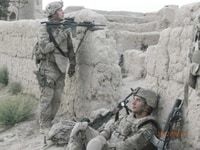
Dallas Haggard and Jarred Ruhl while on a long patrol in Afghanistan in June 2012. (Courtesy of the Carson family)
A few months later Zettel, who had finished college and was commissioned as an officer, stopped in to see Ruhl at his home in Fort Wayne, Ind. Zettel was on his way to a leadership course for new Army officers in Missouri.
Ruhl’s stepbrother told him that Ruhl had pulled a gun on a woman in a traffic dispute just days earlier. “Take his gun,” Zettel advised Ruhl’s stepbrother. “Take it apart and hide the pieces so that he can’t get it.” It was impossible, the stepbrother said. Ruhl took his gun everywhere.
Ruhl confided to Zettel that there were days when he couldn’t stop thinking about killing himself.
“How are we going to fix this?” asked Zettel, who helped Ruhl sign up for counseling at a VA hospital.
Before he could start, Ruhl pulled his gun on an acquaintance at a party. His stepbrother tried to wrestle it away and the firearm discharged, severing Ruhl’s femoral artery. He died before paramedics arrived.
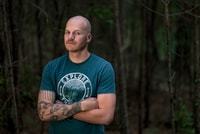
“We kind of got betrayed,” said Dave Zettel outside his home in Blythewood, S.C. “We were pegged as if we were like a rogue unit. Which we clearly weren’t. It was kind of disheartening.” (Bonnie Jo Mount/The Washington Post)
Zettel came back for the funeral, then returned to Missouri to finish his five-month leadership course. Four years had passed since the war crimes, but the murders and their aftermath still seemed inescapable. A captain teaching Zettel’s class on rules of engagement used Lorance as a case study, telling the new officers that Lorance had been trying to impose discipline on a platoon that had lost control after one of its soldiers was shot in the neck. The captain was referring to Hanes, who had given Zettel his first salute when he was commissioned as an officer.
Lorance’s soldiers, the captain continued, had violated the rules of engagement and now Lorance, who hadn’t fired a shot, was serving a 19-year prison sentence.
Zettel blew up. “I was there and you need to stop running your mouth,” he recalled shouting at the instructor.
The instructor suggested they step out of the classroom. Zettel grew angrier.
“If I ever see Lorance on the street,” he said. “I am going to rip his f—ing throat out.”
‘Y’all are being led the wrong way’

Sean Hannity of Fox News arrives in National Harbor, Md., on March 4, 2016. (Carolyn Kaster/AP)
Six days after Trump was inaugurated as president, Hannity asked him in a White House interview about pardoning Lorance. “He got 30 years,” Hannity said incorrectly. “He was doing his job, protecting his team in Afghanistan.”
“We’re looking at a few of them,” said Trump of the case.
In the months after his conviction, Lorance had begun to receive support from United American Patriots ( UAP ), a nonprofit group that represents soldiers accused of war crimes. UAP helped Lorance find new lawyers who claimed in an appeals court filing that they had uncovered evidence showing that the younger victim was “biometrically linked” to a roadside bomb blast that occurred before his death. The sole survivor, the lawyers said, took part in attacks on U.S. forces after the Americans tried to kill him.
“The Afghan men were not civilian casualties . . . but were actually combatant bombmakers who intended to harm or kill American soldiers,” the lawyers wrote in their appeal.
In 2017, a military appeals court dismissed the biometric data as irrelevant because Lorance had “no indications that the victims posed any threat at the time of the shootings.” The judges found that the surviving victim’s decision to join the Taliban after the platoon tried to kill him probably would have helped prosecutors by demonstrating “the direct impact on U.S. forces when the local population believe they are being indiscriminately killed.”
But the biometric evidence and support from UAP helped Lorance’s mother and his legal team get on Trump’s favorite television shows — “Fox & Friends” and “Hannity” — where they offered a new account of the killings that differed dramatically from the sworn testimony. In their telling, the motorcycle wasn’t stopped on the side of the road with its kickstand down, as testimony and photos from the trial demonstrated, but was speeding toward Lorance and his men when he ordered them to fire.
“He’s got to make a split-second decision in a war zone,” Hannity said on his television show. “How did it get to the point where he got prosecuted for this?”
“I feel if he had not made that call,” Lorance’s mother replied, “my son today would be called a hero, killed in action.”
Hannity turned to Lorance’s lawyer, John Maher. “Was there anybody in the platoon that was with Clint that said that was the wrong decision?” he asked.
“That I don’t rightly know,” replied Maher, who had reviewed the platoon’s testimony.
“Then who made the determination that this was the wrong thing to do?” Hannity pressed.
“The chain of command,” Maher said.
“People that weren’t there,” Hannity concluded. Hannity and a Fox News spokeswoman did not respond to multiple requests for comment.
In a recent interview, Maher said his response to Hannity’s question had been “potentially inartful.” Lorance was in prison because the 1st Platoon soldiers turned him in and testified against him.
But Maher maintained that Lorance had made a split-second decision to protect his men from an enemy ambush. Some of the 1st Platoon soldiers said that the Afghan men had been standing on the side of the road for as long as two minutes before the U.S. gun truck opened fire on Lorance’s orders. Others, including Lorance, estimated they had been stopped for only a few seconds.
“That’s probably an eternity sitting here in the safety of this environment,” Maher said. “But I assure you that it’s not like that under volatile, uncertain, unforgiving conditions where life and death are right around the corner and a tardy decision results in death or dismemberment.”
The Afghan men were about 150 to 200 yards from the U.S. position when they were killed. To reach Lorance and his troops, they would have had to scale multiple shoulder-high mud walls.
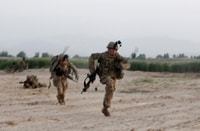
Aaron Deamron, right, and Zach Thomas run for cover as they are fired upon by Taliban fighters during a mission in Zhary district of Kandahar province, southern Afghanistan in April 2012. Thomas would receive a concussion in the incident. (Baz Ratner/Reuters)
Zach Thomas, who had been standing just yards from Lorance when he gave the order to fire, was driving to community college in 2017 when he heard Hannity talking about the Lorance case on the radio.
“My blood just started boiling,” he recalled.
Thomas had spent his last day in the Army testifying against his former platoon leader. He was just 18 when he left for Afghanistan, and like many in the unit, his return home had been difficult. He drank to blunt his PTSD and depression. Two of his sergeants were so worried about him that they let him move out of the barracks and spend his last two months living at their house. His plan after the Army was to forget about Afghanistan and start a new life in his hometown of Crosby, Tex.

Zach Thomas and Jake Jensen before their deployment at Fort Bragg. (Courtesy of Zach Thomas)
Thomas pulled over on the side of the road and looked up the number for Hannity’s radio show in New York City on his cellphone.
“I’m a big fan, but y’all are being led the wrong way,” he told a producer for the show. “This isn’t some innocent guy.” The producer asked him if he knew about the biometric data Lorance’s lawyers had uncovered.
“I don’t know about any of that information, but I was there and these people were not enemy combatants,” he said. He could tell he wasn’t convincing the producer so he gave her McGuinness’s cellphone number and urged her to call him. She talked with McGuinness as well but never invited him on the show.
A handful of other soldiers from the platoon did their best to counter Lorance’s story. Todd Fitzgerald, who was also standing near Lorance when he ordered the killings, took to Reddit to defend the unit. He and several other soldiers spoke to the New York Times for a story that detailed the inaccuracies in Lorance’s defense. Fitzgerald, McGuinness and Gray were interviewed for a documentary about the case, “Leavenworth,” that aired on the Starz Network.
In April 2018, the platoon suffered its fourth death since returning home when Nick Carson, 26, crashed his car late at night.
Carson had been with McGuinness in Afghanistan on the day of the killings, and like his squad leader had been threatened with war crimes charges.
“I don’t know what’s fixing to happen, but our platoon leader is making us all out to be murderers,” he told his parents in a 2012 phone call from Afghanistan. “Just know, I am not a murderer.”
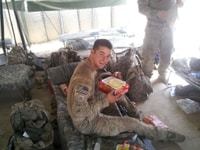
Nick Carson eats a meal during his deployment in Afghanistan in May 2012. (Photo by Dave Zettel)
Carson’s mother and stepfather were at Fort Bragg a few months later when he returned from the war. “He got off that big plane, hugged us and cried and then he said, ‘I love y’all but I need to be by myself. I just need to go,’ ” recalled his stepfather.
Carson stayed in the Army after the combat tour, but he struggled with PTSD, depression and anger. He and Ruhl had been best friends and were supposed to go to Hawaii together when they returned from Afghanistan. After Ruhl’s death, Carson tried to explain on the platoon’s private Facebook page why he was skipping his friend’s funeral. “It’s not that I can’t physically be there,” he wrote. “I won’t let my last memory of Jarred be at his funeral. I am sorry for that. Most of you know how close Jarred and I were, so this has been extremely difficult to accept.”
On the night of the car accident that killed him, Carson had been drinking and wasn’t wearing a seat belt. His parents said he may have fallen asleep while driving. The platoon blamed the war crimes and the deployment.
In Afghanistan, the platoon had dubbed themselves the “Honey Badgers” after the fearless carnivore.
Back home, they began to refer to themselves as “the cursed platoon.”
‘Who is it this time?’
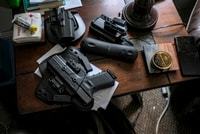
A loaded pistol on a side table in the home of Lucas Gray in Pulaski, Va. (Bonnie Jo Mount/The Washington Post)
On October 23rd at 2:44 a.m., Twist’s wife, Emalyn, messaged Sgt. 1st Class Joe Morrissey, who had been Twist’s team leader with the platoon in Afghanistan.
“James committed suicide tonight,” she wrote from the hospital where the doctors were preparing to harvest his organs. “Could you let his other Army friends know. . . . This is a fucking living nightmare.” It was the platoon’s fifth death since returning home four years earlier.
Morrissey woke to the message at Fort Bragg and began sobbing. His soon-to-be ex-wife knew immediately that another member of the platoon was gone. His first call was to McGuinness, who was returning home from a late-night shift as a bouncer at a Fayetteville bar. The two immediately began calling the rest of the platoon, which was scattered across the country.
The deaths had imbued them with a grim fatalism. “Who is it this time?” a few answered when they saw the 5 a.m. calls from Morrissey’s phone.
“It’s James,” Morrissey said again and again.
At Fort Jackson, Zettel was administering a predawn fitness test to recruits when he got the call. He punched a fence and rushed back to his office so the new soldiers wouldn’t see him fall apart. Alone at his desk, Zettel thought about the steady stream of calls and texts Twist had sent him over the past five years, and he wondered if the messages were an indirect way of asking for help.
McGuinness caught Gray as he headed off to his job at a weapons arsenal in southwest Virginia. His wallpaper on his work computer was a photo of Twist and him in Afghanistan, their rifles slung across their chests. “Back when we were cool,” Twist had written when he texted it to Gray.
The hardest call was to Walley, the soldier Twist had dragged from the blast crater. “What’s wrong?” his fiancee asked him when he got the call. “It’s Twist,” Walley told her. She tried to hug him, but he pushed her away. “I need to take this in alone,” he said.

Samuel Walley with his fiancee Hannah Smallwood in their garage in Buford, Ga. Walley lost his right leg and part of his left arm in Afghanistan. (Bonnie Jo Mount/The Washington Post)
At the funeral, Walley spoke first for the platoon, rocking back and forth on his prosthetic leg. Walley was wounded a month before the murders, but they had affected him too. At times, he felt abandoned by those who had tried to distance themselves from the unit, the murders and the war. “I have to wake up every single day and look in the mirror. Every single day I am hopping in a wheelchair,” he often thought. “I don’t get to forget.”
In January 2016, he was drunk and despondent in his apartment outside Atlanta and accidentally fired his pistol through the ceiling and into the apartment above him. After the shooting, Walley cut back on his drinking and returned to college. He was just one semester from graduating.
He stared out at the packed and silent church.
“Twist would probably give me a little bit of crap right now for having not wrote a speech,” he began. “But I figured I’d just tell a story. It’s a little bit of a harsh story, but I think it needs to be told.”

Members of the 1st Platoon at James O. Twist’s funeral in Grand Rapids, Mich., in November 2019. From left: Joe Fjeldheim, Jake Jensen, John Twist, Zach Thomas, Dan Williams (holding left side of flag), Alan Gladney (wearing glasses), Lucas Gray (partially visible), Reyler Leon, Samuel Walley, and slightly behind him is Dave Zettel, Brandon Krebs, and Mike McGuinness (in sunglasses), Brandon Kargol, Joe Morrissey, Dom Latino, Dallas Haggard, Brett Frace and Zach Nelson at the far right. (Courtesy of the Twist family)
Walley had spent dozens of hours reconstructing every second of the day he was injured. Eight years after the blast, he and his fellow soldiers would still argue over the smallest details: What kind of bomb had caused his wounds? Was it a pressure plate or remote-detonated? What exactly did Morrissey say as he and Carson lifted Walley into the helicopter? For Walley, the details were sacred. Remembering brought him comfort.
He took a breath and described the explosion and its aftermath. “My right leg was about 20 feet away. It was completely removed. My left leg, the tibia ripped through the [skin]; my foot was facing toward my butt,” he said. His right arm was mangled.
“Twist ended up coming through this cloudy haze,” Walley continued. “He was the most selfless man that I ever knew on this planet. He did not care if he died. He did not care if his limbs were to get ripped off. He didn’t care. He just cared that his guys were okay.”
A few minutes in a combat zone can define a life for good or for ill. “I believe that 10 minutes defined Twist,” Walley said.
Morrissey spoke next of Twist’s successes as a soldier, state trooper and father. “Those of us who knew Twist were extremely proud,” he said. “Unfortunately . . . underneath it all, the demons are still there, still tearing away at us day in and day out.”
‘The men and women in the mud and dirt’

President Trump welcomes Army 1st Lt. Clint Lorance and Army Maj. Mathew Golsteyn, left, at the Republican Party of Florida’s Statesman Dinner in December 2019, in Aventura, Fla. Both soldiers were granted full pardons by Trump. (Joyce N. Boghosian/The White House)
The 1st Platoon soldiers were still filtering home from Twist’s funeral when Pete Hegseth, a “Fox & Friends” co-anchor who had advocated on Lorance’s behalf, tweeted that Lorance’s pardon was “imminent.”
The actual release came two weeks later on Nov. 15.
“It’s done. It’s a political move,” one of the 1st Platoon soldiers wrote on the group’s private Facebook page. “Time to move on.”
Ayres, who had skipped all five of the platoon’s funerals, agreed. “Not worth any of our time,” he wrote. “What matters is that everyone that matters knows he is a piece of s—. Let’s move on and enjoy life.”
For McGuinness it wasn’t an option. He couldn’t bear the thought that Lorance was being hailed as a hero by Trump and others, while soldiers like Twist were being forgotten. “I’ve buried people that struggled with what happened, and whether through their own hands or their actions, they’re gone,” he said. “I’m not going to sit quietly while he gets paraded around and they’re not recognized.”
He texted with Gray, who wasn’t on Facebook.
Lucas Gray

Fuck it all. The one reprieve we had is gone.
Mike McGuinness
I feel so shitty right now.

Lucas Gray

I’m going to drink until I can sleep.
Mike McGuinness
I might do the same.

Others in the platoon argued on social media with pro-Trump friends, who insisted Lorance was innocent. “You realize I was f—ing THERE, right?” one soldier wrote to a fellow veteran. “Like you realize I was one of the godd— WITNESSES who testified, right?!”
Later that evening, Twist’s father, John, called McGuinness, hoping to talk about his son and the pardon. McGuinness shared his memories of Twist, who came to the platoon when he was just 19. “We put so much work into him,” McGuinness said. He talked about Twist’s quirks — his irritating tendency to correct McGuinness when he got a minor fact wrong about a weapons system.
Twist’s father asked whether the murders and the trial might have contributed to his son’s torment. Twist wasn’t on patrol the day of the killings, but McGuinness believed that what had happened with Lorance had wounded him too. “Twist had a big heart. He was like Gray. He wanted to do good,” McGuinness said. “When Lorance took that away, he took a little part of Jimmy, too.”

“You don’t go into the military thinking you are going to be part of a war crimes case,” said Mike McGuinness at his home in Raeford, N.C. (Bonnie Jo Mount/The Washington Post)
“This is absolutely amazing,” Lorance said as his car, escorted by the county constable, rolled to a stop in the high school parking lot.
“It’s a hometown hero’s welcome,” said his cousin from the back seat.
Lorance climbed atop a flatbed trailer. Someone from the crowd gave him an American flag. The vice commander of the local VFW handed him a microphone.
“God Bless Texas!” Lorance yelled. “God Bless America!”
At his side was the head of UAP, the group that had worked to free him. Lorance’s case and the publicity generated helped the group boost annual donations by about 150 percent, from $1.8 million in 2015 to more than $4.5 million in 2018.
Lorance, who was wearing his crisp, blue Army uniform — his pants tucked into his boots, paratrooper style — knew exactly what his backers wanted to hear. “We finally have a president who understands that when we send our troops to fight impossible wars, we must stand behind them,” he told the crowd.
“Amen!” cried a voice from the high school parking lot.
“Amen is right!” Lorance answered.
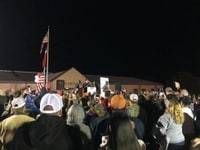
Former 1st Lt. Clint Lorance addresses a crowd as he returns home to Merit, Tex., on Nov. 16, 2019, after he was pardoned by President Trump. (Courtesy of Farmersville Fire Department)
For those in the parking lot that night, Lorance’s freedom was proof that Trump would stand up for them and their town, population 215, at a moment when large swaths of the country seemed to hold them and their way of life in contempt. “You know how many people just want to see that someone cares,” said Tiffany West, 37, who was standing feet from the stage.
Lorance thanked his family and the lawmakers who pressed for his release. He talked about Trump and Vice President Pence, who had called him at the penitentiary to tell him that they were setting him free. “We had a nine-minute conversation,” Lorance said. “Yeah, I was timing it. . . . They took time out of their busy day to ask me what I was going to do with the rest of my life.”
He blasted the craven “deep state” military officers he blamed for his conviction. “That’s not really the military. That’s the politicians who run the thing,” he said. “The men and women in the mud and dirt. That’s the real U.S. military.”
He was still talking nearly an hour later when the television news crews from Dallas, about 60 miles away, began packing up their equipment.
“I’m sorry,” he apologized. “I know it’s cold.”
“Go ahead!” a voice shouted.
“You’re home!” added another.
Soon the crowd began drifting away for the night, past Merit’s post office, its volunteer fire department, its recently shuttered convenience store, and the decaying wood clapboard building that once held its cotton gin. Lorance handed the microphone back to the local VFW’s vice commander, a Gulf War veteran who had organized the gathering and would now get the final word.
“There’s going to be people out there that are going to try to use this against Trump,” he warned. “Well, we’re going to throw it right back in their faces!”

Lorance visits the set of “Fox & Friends” in New York on Nov. 18, 2019, after receiving a presidential pardon. (Mark Lennihan/AP)
The next morning Lorance boarded a plane for New York City, where he appeared on “Fox & Friends” and Hannity’s radio show. In December, he joined Trump onstage at a GOP fundraiser.
In interviews after his release, Lorance insisted that the soldiers who testified against him were pressured by the Army or had turned on him because he was an exacting commander and they lacked discipline. “When I walked into the guard tower and the soldiers didn’t have their helmet or body armor on, I told them to put it on,” he told Blue Magazine, which advocates on behalf of police officers. “And they didn’t like that, they didn’t like taking orders like that, but I was brought in there to enforce the standard.”
‘There’s almost always more to every story than we know’
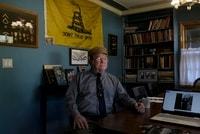
John Twist created a wall in his living room memorializing James and other family members who served in the military at his home in Grand Rapids, Mich. The flag was signed by members of James’s platoon after his funeral. (Bonnie Jo Mount/The Washington Post)
In Grand Rapids, Twist’s father spent much of the winter trying to unravel the mystery of his son’s death. His dining room table was covered with foot-high piles of papers from James’s life.
There were old report cards, passports and programs from high school wrestling matches. A second pile from the Army included a spiral notebook that his son had used as a diary when he was going through basic training. A third pile contained a printout of the essay — “The Invisible War Inside My Head” — that his son wrote the day before he died.
In it, Twist wrote briefly about the killings that had “rocked and split up” his platoon. The longest section of the essay recounted the day Walley lost his arm and leg. “I found Sam in a small crater,” he wrote. “He was missing his right foot and all the muscle and skin around his right tibia/fibula.” That image, he said, played again and again in his head when he returned from the war.
“I really don’t understand what PTSD is,” his father said. “You can read about it, but I don’t get it. So far the only thing I can get is that it’s like having . . . poor Sam Walley getting blown up” playing in your head over and over. “And how do you get rid of that?”
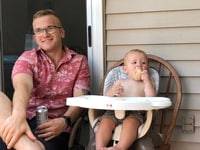
James O. Twist with his son Ben, celebrating his first birthday in August 2019. (Courtesy of the Twist family)
Twist’s wife, Emalyn, 27, also had been thinking about the meaning of her husband’s life and sudden, violent death. In early March she was sitting alone in the parking lot of a nearby Target. Her three children — ages 1, 3 and 5 — were with a friend. She balanced a Starbucks coffee in one hand and hit record on her cellphone camera.
“It has been kind of a bad week, filled with a lot of ‘it shouldn’t have to be that way’ kind of moments,” she said. Earlier that morning, she had turned over their house keys to the new owners. Her 5-year-old son spotted the family’s moving trucks in the driveway and panicked, yelling for her to “stop them.”
Twist’s children remembered their father as a dad who liked to wrestle and sing them to sleep. Emalyn couldn’t forget her husband’s insecurity, bouts of self-loathing and verbal abuse. On the night her husband took his life he was upset with her for going to see a therapist and terrified that she was going to divorce him. In a blog post, Emalyn described him slamming his head into the kitchen counter until blood was running down his face. Then he stormed to their bedroom and shot himself.
Emalyn pressed a pair of leggings to her husband’s head in a futile attempt to stop the bleeding. With her other hand, she dialed 911. As she listened for the sound of approaching sirens, she stifled the urge to vomit and prayed that their children would not wake.

Emalyn Twist writes about her experience following Twist’s death in Emalyn’s Blog: Words of a Young Widow. (Bonnie Jo Mount/The Washington Post)
“I couldn’t stand to live in that house or sleep in that bedroom when I had seen so much in there, and that just makes me mad, because I loved that house and I loved that neighborhood,” she said to her cellphone camera. “And I shouldn’t have had to leave. I shouldn’t have had to pull my kids out of their little social circle and all those people who loved them. It shouldn’t have to be that way.”
For years she had helped her husband hide his pain from family, friends and even his fellow soldiers. Now she was determined to be honest. “I just don’t have to keep up this facade of the grieving widow all the time, even though that’s also what I am,” she said. “There’s almost always more to every story than we know. It’s important to pay attention to that.”
She stopped recording, turned on the ignition and picked up with her day.
‘I love you’

Dave Zettel at home with his wife, Kim, in Blythewood, S.C. The couple are expecting their first child. (Bonnie Jo Mount/The Washington Post)
In April with the country locked down by the coronavirus, McGuinness arranged for a dozen of the guys from the platoon to get together on a video call for beers. He and Walley were finishing up their last few college courses before they graduated. A couple of the soldiers and wives were expecting their first children. Two were in the early days of divorces.
An hour into the call almost everyone was drunk or stoned — except for the pregnant wives. One soldier kept streaming as he sat on the toilet. When he was done everyone screamed at him to wash his hands. Another soldier vomited and curled up on the floor.
“This is better than getting together at funerals,” McGuinness said cheerily.
The troops talked about their plans for the future. Morrissey was just back from another tour in Afghanistan, where he mostly sat on base while the Afghans fought each other. “There’s no war left there anymore,” he said.
“What are you going to do when you retire?” McGuinness asked him.
“Let me finish, before you laugh,” Morrissey replied. “I’m going to go to school to be a barber and open one of those high end barber shops where you can get a drink, a real gentleman’s haircut and shave with a straight razor.”
Walley tried to talk, but everyone was talking over him. “No one listens to me,” he joked. “Everyone just stares at the guy with two limbs.” He and his fiancee were planning their wedding for the spring of 2021. They had already reserved a “mansion where we can fit the whole platoon,” he said.
“Just tell me the day and I’ll be there,” McGuinness promised.
Zettel and his wife were expecting their first child on Aug. 10. He was planning on leaving the Army for good in October. “It’s not going to join the Army,” Zettel said of his unborn child. “I’m going to burn everything so it doesn’t even know I was in the f—ing Army.”
The soldiers talked about the guys they had lost to suicide and self-destructive behavior. And they spoke briefly about Lorance, who has a memoir titled “Stolen Valor” that is going to be published by Hachette Book Group in the fall, when Lorance has said he is planning to start law school. A blurb for the book, posted by the publisher, calls Lorance “a scapegoat for a corrupt military” and asserts that “his unit turned on him because of his homosexuality.” Lorance’s lawyer said there was no evidence that homophobia played a role in conviction.
“We looked,” Maher said, “and we came up with nothing.”
In interviews, troops said that in Afghanistan they didn’t know Lorance was gay and wouldn’t have cared.
“We took s— from so many people for so long,” McGuinness said. “I’m not letting that happen anymore. I’m going to fight back.”
The soldiers shared tips about how to find a good therapist and promised to look out for one another so that there would be no more funerals.
“You guys mean everything to me,” McGuinness said. “We have to do this more often. We have to look after each other. If you guys are hurting, hit me up. We can do this instead of just letting things fester.”
He rose from his desk chair — a little wobbly from all the beer. It was 2:30 a.m., and they had been talking for more than four hours. “I love you a–holes,” he said, and signed off the call.

An American flag decorates a roof along a country road in North Carolina. (Bonnie Jo Mount/The Washington Post)
[ Are you a veteran? We want to hear your response to this story. ]
Under the current administration, the Office of the Pardon Attorney has become a bureaucratic way station, data and interviews show.
0 notes
Quote
There is still some way to go in the Champions League final at Wembley. The ball makes its way across the grass with the ease of a game in somebody's back garden. Andrés to Xavi, Xavi to Messi, Busquets comes to get it again and again. Round and round it goes. Barcelona's most treasured possession. Alex Ferguson, the man who has done it all in football, can’t find a way of stopping them. It is not for want of trying. He couldn't in Rome 2009 and he hasn't been able to since; two years later, United are set to fall in London too. Barcelona are about to become European champions again. The thing I most remember about that final is the last half an hour; Man United players were angry, really furious, because we had turned Wembley into a huge rondo and there was nothing they could do about it. They kept swearing, shouting everything under the sun. It was incredible. Some of my team-mates couldn't understand them, but I could: ‘That's enough, stop fucking about. We’re dead. And there are still twenty-five minutes left!’ Xavi, Iniesta, Messi, Busquets, Alvés, who was practically a midfielder that day, kept going: pim-pam, pim-pam pim-pam. I don’t talk much about that game as I commentate on it like the moment, the image is burnt into my mind. It was, after all, one of the best games I have played for Barcelona. Almost the perfect game. Not because of the atmosphere at Wembley, not even because Puyol and Xavi did the most wonderful thing and handed me the honour of lifting the trophy. No. Those are mental images that will be with me forever, of course. But what I remember most of all is the Football . For the first goal, Andrés plays the ball to Xavi, Xavi looks towards the stands but, with the outside of his boot, finds the run from Pedro as Pedro shoots. Van der Sar goes down early, to his right, and the ball goes past him to the left. The second Barça goal is much the same: Andrés, Xavi, Leo. The three little guys combining to put us back in the lead after Wayne Rooney's equalizer. I don't really remember the goal from Leo, but I do remember him kicking the microphone. When it comes to Andrés, I feel a special affection. He played just in front of me and he was forever getting me out of trouble. You’d give him the worst possible pass, an ‘English pass’ and you knew he would still control it. You couldn't explain how but he would bring the ball under control and go past players, one, two, three, four or five of them as if it was no problem at all. I was endlessly amazed by the way he seemed to be able to get the ball to do whatever he wanted and then his ability to see everything that was happening on the pitch. He was always looking forward and yet he saw it all, every detail around him. At Wembley in 2011, Andrés reached his peak. He had often been decisive. but that day he was untouchable. It was the first final he had played pain-free. No stress, no concerns, no discomfort. This was a game he could actually enjoy as if he had been transported back to the play grounds of Fuentealbilla. This time he could just play. Rijkaard had left him on the bench in Paris in 2006; three years later in Rome he was playing on one leg because of injury in London in 2011, at least, he was in perfect condition. Andrés never says anything on the pitch, he just plays football. His quality talks for him. He never moans even if he has more reason to moan than anyone else. The more they kick him, the more they try to wind him up, the better, for him and for his team. Man United's players never really got the chance to kick Iniesta, Xavi or Messi, the ball moved too quickly for that; they were overwhelmed. When Barcelona are at their best, their play can be measured by a split second, by a single centimetre. The precision is such, the speed too. No one controls space and time like they do. Iniesta especially. Man United only committed 16 fouls in 90 minutes; they weren’t able to commit more even if they wanted to. Once David Villa’s goal went in, curling towards the top corner from the edge of the area on the 69th minute, Man United’s fate was sealed, their players had been chasing shadows, always arriving too late, never quite getting there. They didn't so much play, as follow the play. They were at the mercy of a Barcelona side that committed just five fouls, took 16 shots, 12 of them on target and scored three times. And that in a Champions League’s final. It finished 3-1 for Barcelona. There could have been no better homage to Johan Cruyff's philosophy, the one that changed Barça forever: ‘If I have the ball, my opponent doesn’t.’ Cruyff said; Wembley expressed that perfectly. The English are said to have invented the game, but in their national stadium, the biggest club in England only managed three shots two of them off target. Pim-pam, pim-pam. pim-pam . . . it was never ending.No one expected me to start the game that night. Two months before, a statement from Barcelona revealed that I had been diagnosed with cancer. Doctors had found a tumour in my liver. That was on 15 March 2011. The next day, I went down to the dressing-room to see my teammates where I encouraged them, not the other way round. I was the positive one, the optimistic one. I told them: ‘I'm a lucky guy, they found it in time.’ As I went into the operating theatre two days later, I joked with a team-mate: 'Hey, give me your liver, I could do with it.’ After all that, there I was, at Wembley on 28 May, as if nothing had happened. l never imagined that I would play in the final. Not in my wildest dreams. The only thing I said to the manager was: ‘I’m available if you want me.’ But I didn't think that I would even be on the bench. In fact, I was happy just to have the chance to go to Wembley and support my team-mates from the stands. But then in his last team-talk in the Wembley dressing-room, Pep Guardiola changed everything. It was an hour before the game when he told me I was going to play. He told me at the same time as he told everyone else. l couldn’t believe it. What a surprise! I would have liked him to have warned me earlier, but those are the kind of surprises you like. And maybe it was good to only find out at the last minute, when you think about everything I went through between that moment and the start of the game. The only thought that crossed my mind was: ‘Bloody hell, don't be the player that lets them down; they'll kill you if you do. Imagine that, ten players in peak conditions and you're the one that’s not. I can't let that happen.’ It didn't happen. I was lucky that we had such a great team. Very lucky. Rooney came up to me before the end of the game, it must have been around the eighty minute, and told me: ‘That's enough. You've won. You can stop playing the ball around now.’ It was around then, too, that Carles Puyol, a substitute, came on, ready to collect the European Cup at Wembley just as José Ramon Alexanko had done in 1992. It was a gesture from Guardiola that would end up not being fulfilled because Puyol was about to make a gesture of his own. He handed the captain's armband to me and sent me up to lift the fourth European Cup of Barcelona’s history. Paul Scholes stood wearing a red and blue shirt with a number 8 on the back, the opponent that Barcelona's players admired more than anyone else, and whose shirt they had argued over, had been so overwhelmed by what he saw, so enamoured of that player who floated around the field at Wembley, that he had approached him before the end and asked for his shirt. Well. of course! How could he not want Andrés’ shirt? That’s no surprise; it strikes me as the most normal thing on earth. I have one of Andrés’ shirts too. One day, in thirty years, I'll open my wardrobe, look at that and think: ‘I played with Andrés Iniesta.’ There are shirts you don’t show off, but that one.. I’m convinced that if you asked the United players whether they knew that Iniesta was injured in 2009, none of them would have had the slightest idea. It's better if he's a hundred per cent, but with the vision, technique, experience and talent that Andrés has, even sixty or seventy per cent is enough. I sometimes think it is better to suffer some pain, because it shows you where your limits are.It's when everything is going perfectly that bam, something happens. I don’t know why, but injuries, muscle tears, always seem to happen when you're flying, when you least expect it. Andrés played through the pain in Rome, but when it came to that footballing cathedral in London two years later, he won the European Cup and the admiration of Paul Scholes. At his home in Fuentealbilla in wine cellar, and on the wall hangs a framed Paul Scholes shirt from that night at Wembley.
Eric Abidal talking about the 2011 Champions League final and about Andrés Iniesta.
2 notes
·
View notes
Text
Act 1: Chapter 1-Last SEAL Day
1230 hours
December 15, 2004
Fallujah, Iraq
Second Battle of Fallujah/Operation Phantom Fury
It is a sunny hot day in the city of Fallujah. In the streets there were less people outside because of the war between Iraqi Insurgents and Al-Qaeda against the United States, the Republic of Iraq and the United Kingdom forces which is the Second Battle of Fallujah. On top of the rooftop of a building, are two US soldiers wearing desert camouflage uniforms with US flag patches, load bearing vests with Kevlar vests under it and in a prone position next to the edge. One is a mid-twenties year old Hispanic American man and one is a early twenties year old Caucasian woman. The male soldier’s height is 6′ 3″ and her weight is 205 lbs and the female soldier’s height is 5′ 9″ and her weight is 130 lbs. The female soldier is not wearing her ballistic helmet, exposing her short dark brown hair and she is holding and using the rifle scope of her rifle, which is a Mark 12 Mod 1 Special Purpose Rifle with a tan paint scheme, Harris bipod, solid stock, Leupold Mark 4 scope and suppressor. The other soldier has a M4A1 rifle fitted with a ACOG Scope but is looking through a spotting scope, spotting for the female soldier. The two soldiers are United States Navy SEALs of SEAL Team Three, Sniper Elements of Alpha Platoon. The spotter is Petty Officer Third Class Trevor Reyes and the sniper is Petty Officer Second Class Jessica Sawyer. Their assignments are to do overwatch on insurgents and bomb sweep until base wants them to return.
“Where is everyone?” Asked Petty Officer Third Class Trevor Reyes.
“It’s a warzone, dumbass.” Said Petty Officer Sawyer. “Civilians hide in warzone. You should already know that.”
“I meant the bad guys. It’s been four hours without killing a savage.”
“They're mostly already know that we’re scoping them which is why they’re hiding.”
It has been too long without seeing nor killing any Iraq insurgents. The insurgents already knows what the Western forces are doing and sometimes knows where they’re located. They even placed bounties on them…mostly SEALs. The two then start to go silent for a few seconds until Reyes broke the silences.
“You know…my wife got a promotion from her job.”
“That’s great man.” Jessica congrats on her comrade while still looking through her scopes. “But you should know that I hate your wife.”
“Hey come on. You’re still mad about what happened that day.”
“Yup. You’ve married a bitch from hell.”
“She was her first time being drunk.”
“No excuses. She’s a bitch and there’s one thing that she can fix it."
"What?”
As Reyes turns to Sawyer with curious look on his face, Sawyer turns to him with still her serious face, place up her right hand only two fingers up making a ‘V’ close to her face and stick her tongue out wiggles it a few times.
“Oh fuck you, bitch.” Said Reyes as he gave Sawyer the middle finger.
Both of them were laughing a bit but not loud because they’re on mission and had to go back to their scope, continuing scanning the deserted streets of Fallujah. Sawyer is still single and mostly stay with her mother to take care of her. Her mother has Lung cancer because of her old smoking habits. When Sawyer is away, her other family members takes cares of her. Sawyer sometimes get worried that she may lose her like she lost her father who died in 1993. While Sawyer was looking through the scope of her sniper rifle, scanning down the road of the Iraqi town, at 100 yards from Reyes and her position there are two Iraqis, both in their thirties carrying AKs walking through the streets and then stopped by a building and came up to the door and one of them started knocking on it. Few seconds later, a older Iraqi male came out and started talking to the two Iraqi insurgents. Sawyer was figuring out who the Iraqi man is. She was getting a feeling that he seen the man before.
“Hey Reyes…I think I’d seen this old geezer before.”
“From where? Our board?” Reyes questioned.
“Positive.”
Possibly an Al-Qaeda member from the High Valuable Target board from base. Sawyer started getting on her went to her radio started calling base using her call-sign 'Alpha Two-Four’.
“CP, CP this is 'Alpha Two-Four’ do you copy 'over’?”
“This is 'CP’. Go ahead, 'over’.”
She was giving the description of the man in the building who she thinks is Faadi Zaidi. The man she was describing is in mid forties, tall about 6′ 2, have a very long black beard, all black clothing, little brown tan and wearing an eye patch. Jessica was given the 'stand by’. The people at base must be analyzing the description. She still have the man on her crosshair and the man is still talking to the two armed Iraqis. They have been waiting for a minute and then,
“'CP’ to 'Alpha Two-Four' the description that you gave us…we believe the man is Nawf Shaheen, an Al-Qaeda lieutenant. You have the green light to assassinate target, over.”
“Roger, 'CP’.” Said Sawyer. “'Alpha Two-Four’ out.”
The SEAL sniper have permission to assassinate the Iraqi man who is Al-Qaeda. Reyes started calculating the wind speed and distance for Sawyer. Sawyer was even adjusting her rifle scope. After the calculation, Reyes gave Sawyer the green light to execute the target.
“Fire, Fire, Fire.”
Sawyer pulls the trigger and the bullet started flying from the barrel of her sniper rifle and to the Al-Qaeda Lieutenant. The bullet then hit the center of the Al-Qaeda Lieutenant’s head, between eyes. Blood started to splatter and the man fell backwards and landed on his back. The two Iraqi men were shocked of what just happened to the lieutenant and started looking around to know who took the shot. One of the insurgents then saw a flash on a roof a hundred yards away. He then noticed a sniper, which is Sawyer and started pointing and shouting.
“الشياطين الغربية هنا ! (Western devils are here!)” Yelled the armed Iraqi insurgent in Arabic.
Jessica then fire two rounds at the armed insurgent and kill him with two direct hits to the chest. The other one started fleeing to cover after firing a couple of round of his AKMS at the two SEALs. Jessica return fire by firing three more rounds at the Iraq militant. All of the a sudden a lot of Iraqi insurgents came out from houses and started firing at the SEALs. Even a few insurgents got on the roof of the buildings and started shooting at the SEALs. Sawyer and Reyes were taking fire. Bullets were flying pass them a hit the building that they’re on but luckily didn’t get hit by any bullets. Reyes pulled out a M79 Grenade Launcher, loaded 40 mm grenade, stood up on one knee, aim the M79 at the insurgents on a roof and fired the round at them. The round landed next to four Iraqi insurgents and the explosion killed four of them. Reyes then switches his M79 to his a tan painted M4A1 rifle which is fitted with a ACOG scope and grip and returned fire. Jessica was dropping a lot of Iraqi militants with one kill shot each and haven’t missed yet. It didn’t really matter because there were more of them coming at them plus they were coming towards the two.
“BACK! FALL BACK! WE NEED TO GET OFF THIS BUILDING!” Yelled Sawyer.
“LADIES FIRST! I’LL COVER!” Yelled Reyes.
Sawyer got up and started running back towards the door that leads to the stairway and Reyes follows. Sawyer and Reyes makes there way to the last floor of the building and when they got to the door entrance, a large group of Iraqi militants were coming at them while firing their weapons at them. Sawyer and Reyes had to held their ground and return fire. Reyes uses the door as her firing position and Reyes uses the window on the right side. Both of them were dropping down a lot of insurgents but still more of them kept coming. The building’s entrance is the front door and the only way out. Not only that, there were a lot of armed insurgents coming their way and the SEALs needed to exfil. Sawyer got away from the door and got on her radio to call for help.
“'ALPHA TWO-FOUR’ TO 'BASE’, WE’VE BEEN COMPROMISED! WE’RE ON THE GROUND AND ON THE MOVE! WE NEED IMMEDIATE QRF, 'OVER’!”
“Roger 'Two-Four’.” Command Base replied. “Send us your coordinate grid, 'over’.”
Sawyer started explaining their coordinate of their location. After that, they were told to sit tight and Quick Reaction Force Team will extract them. Reyes started telling Sawyer to move her ass to a new spot for cover while he was providing covering fire with his M4. Sawyer move away from her cover and started running out of the building so she can get to her next cover…until there was a medium sized explosion that came from the ground. Most likely a I.E.D. (Improvised Explosive Device). Reyes was pushed backwards to the ground by the force of the explosion. Reyes manage to recover and turns look outside and noticed that when the smoke cleared he saw Petty Officer Sawyer on the ground. He was shocked that she’s down. Shocked that he seen a SEAL down. This was the first time a SEAL down in Iraq.
“SAWYER! SAWYER!” Reyes yelled.
There was no response from Petty Officer Sawyer. Reyes was now getting shot at. The Iraqi insurgents were making their way to Reyes and Sawyer but Reyes started returning fire with his M4 rifle, trying to keep them away from Sawyer. He knows that Sawyer needs medical attention but he couldn’t get to her when he’s getting shot at. Sawyer on the other hand is disoriented, cuts on her face, both of her ears are ringing plus bleeding and worst…her lower right leg is majorly damaged, feet to tibia. It is shredded and blood was pumping out. Sawyer couldn’t move and was starting to pass out. Everything started to go pitch dark for her. Thirties minutes later holding of a lot of enemy combatants, The United States Marines Quick Reaction Force and a couple of SEALs of Alpha Platoon finally arrives. They set up a perimeter and started engaging the Iraqi insurgents. Two SEALs started rushing to her but she has already passed out. She won’t know if she’ll make it to the hospital…or not. The situation she’s in and the injuries she has…this is most likely her last day of being a Navy SEAL.
0 notes